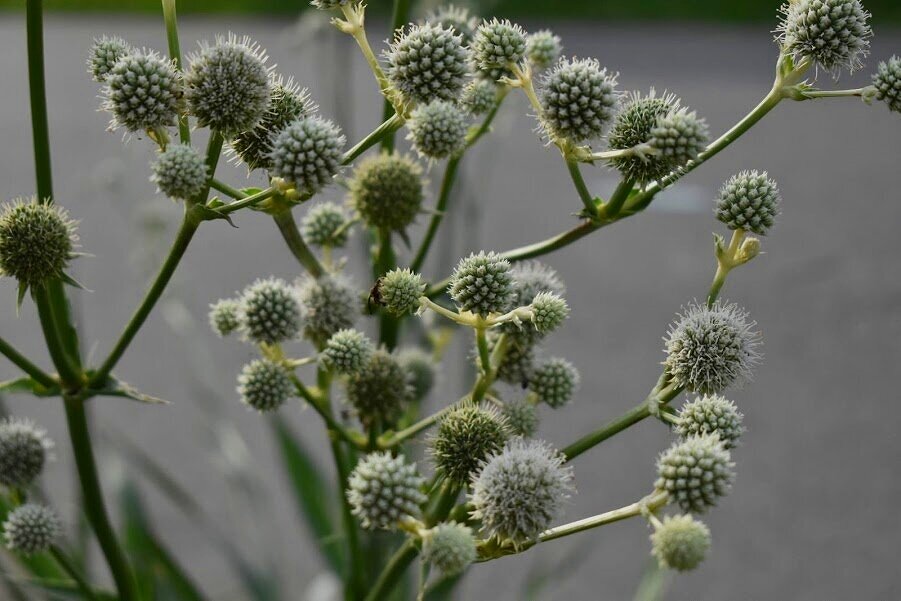
Our Story
Saturnia Farm is a nursery, flower farm, and homestead with growing and land management practices guided by principals of beauty, permaculture, and ecology, started in 2019. We started small, in the hours between full time jobs, with saved seeds, a collection of willow cuttings, some perennial plugs and stock plants, and a handful of laying hens. We are still plugging away, growing a little more each year as we can, and learning a lot along the journey!
Our mission is to provide holistically-grown, affordable specialty perennials, natives, and edible landscaping plants for the beautification and ecological benefit of Western North Carolina. We value plants and garden design that can transform a standard landscape into a life-giving garden for both people and wildlife, educating and inspiring us humans to a higher aesthetic, creative, and environmental landuse ethic.
We are working toward transforming the four acres of lawn and weeds we started with to include expanded nursery areas, native meadows, a permaculture orchard, perennial and woody stock beds to supply plant propagation material, living willow structures, rotating food and cut flower production rows, perennial borders and various demonstration gardens for education.
Ben Pick grew up in Asheville and has been deeply influenced by the surrounding natural abundance of the Blue Ridge Mountains. Ben studied horticulture at NC State, then spent many years working in public and private gardens around the US and abroad, and a few farms too, learning everything he could about plants and how to push the limits with innovative growing and gardening. In addition to Saturnia Farm, Ben runs a small garden services company, Meadow Edge. Things that make Ben happy: baking bread, a sharp garden edge, traveling and seeing plants in their native habitats, climbing trees, good classic tools, family, Sundays.
Sarah Coury is a native of the Midwest, where she grew up in kinship with the native flora and fauna of the Great Lakes and remnant tallgrass prairies, planting trees and learning birdsong with her dad. After some years working in wildlife conservation, Sarah developed a passion for creating landscapes that combine the artistic aspects of ornamental gardening, wildlife habitat creation, and practical human uses. Things that make Sarah happy: hiking, listening, seeds, insects, the power of flowers to transform entire systems, family & friends, photography, spirit of place, equality, hard work, her cute dog and awesome teenage son, Oliver.
Io moth (Automeris Io), a member of the Saturniidae (Wild Silk Moth) family, which includes the largest and most visually striking moths in North America. Pictured here on a buttonbush (Cephalanthus occidentalis), one of its larval host plants, in the nursery.
Saturnia Farm is named in honor of the giant silk moths, or Saturniidae, magnificent creatures often unseen in their adult form due to nocturnal and ephemeral lives. We chose this name because so many of the plants we grow are not only beneficial to wildlife, but are absolutely essential to their continued creation and survival.
Nothing illustrates this dynamic better than the intertwined relationship between butterfly and moth species and their larval host plants — where plants truly do make animals. All butterflies and moths are specialists in the caterpillar stage, when they can only eat specific plant species, so adults will only lay eggs on those species. Monarch butterflies and milkweed. Pipevine swallowtail butterflies and dutchman’s pipe vine. Io moth and hackberry, buttonbush, willow, redbud. Without finding enough of these necessary plants, they cannot reproduce. We feel honored to grow plants that grow animals!
What a blessing it is that, with the right plants and caretaking practices, we can create a garden that creates these splendid critters, and also fuels the entire food web, for caterpillars and other insects born from plants in turn make the lives of birds, toads, small mammals, fish, turtles…
Helenium autumnale (Helen’s flower) feeding 3 different pollinators at once. We encourage folks to plant native flowering plants to support our pollinators! We truly can’t live without them — one-third of our food requires pollination services from an insect! Helenium autumnale also makes a stellar cut flower, lasting for 2-4 weeks in a vase.
A male goldfinch feeding on seeds of Cirsium altissimum (tall thistle) a native thistle in Sarah’s front yard meadow, late summer. The goldfinch’s life cycle is intertwined with the thistle — they wait until the thistles bloom to breed, as thistledown is a main component in goldfinch nests.
Seed starting, early spring
Spigelia marilandica (indian pink), opening in the nursery.
(Visits BY APPOINTMENT ONLY)
SATURNIA FARM
45 Wilse Silvers Drive
Weaverville, NC 28787
Phone: 828-337-1889, 269-578-6906
Email: saturniafarminfo@gmail.com







